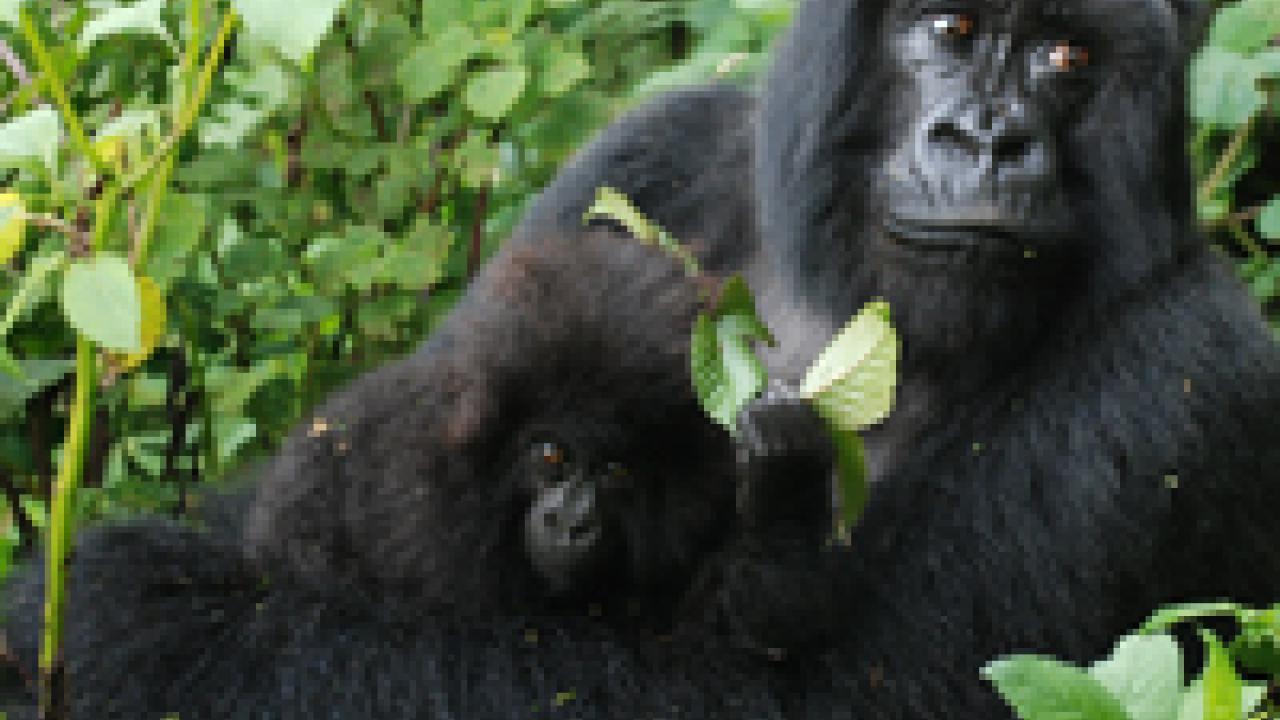UC Davis launched a new “One Health” program April 23 to conserve the world’s remaining 740 mountain gorillas by caring for not only the gorillas but also the people and the other animals that share their home in the forests of central Africa.
With $750,000 in funding from the David and Lucile Packard Foundation, UC Davis will establish the Mountain Gorilla One Health Program in the School of Veterinary Medicine’s Wildlife Health Center.
The new program will partner with the existing Mountain Gorilla Veterinary Project, begun in 1986, to continue improving gorilla health and survival by addressing human health, livestock health and agricultural issues.
“The concept of ‘One Health’ — that human, animal and environmental health are inextricably linked and should be considered holistically — is a core principle of the UC Davis Wildlife Health Center,” said wildlife veterinarian and center assistant director Kirsten Gilardi, who will lead the Mountain Gorilla One Health Program.
“We are proud to become partners with the Mountain Gorilla Veterinary Project, one of the few true, on-the-ground examples of One Health in action anywhere in the world.”
The Mountain Gorilla Veterinary Project’s longtime director, veterinarian Michael Cranfield, will join the UC Davis staff while continuing to oversee the work of the project’s seven veterinarians and 12 technicians and staff members in Rwanda, Uganda and the Democratic Republic of the Congo.
“The collaboration with UC Davis will help improve the health and welfare of the humans and animals living around the gorillas,” Cranfield said. “This in turn acts as a buffer to help prevent disease — the gorillas’ leading cause of death — from entering the park and affecting gorilla families.”
UC Davis will investigate disease threats facing mountain gorillas, help expand medical care for the humans working in and around the gorilla parks, and improve the health and well being of livestock to benefit the families who depend on them for nutrition and income.
The Mountain Gorilla Veterinary Project was established in 1986 by the Morris Animal Foundation at the request of primatologist Dian Fossey, who saw that the population was dwindling rapidly, in part due to sickness and injuries caused by poachers. The Morris foundation managed and funded the gorilla project for its first 20 years and has provided financial support since it became a separate 501(c)(3) nonprofit in 2005.
Combined with anti-poaching patrols and habitat-protection efforts of the Rwandan, Ugandan and Congolese governments and other organizations, the Mountain Gorilla Veterinary Project’s medical program has helped increase the number of mountain gorillas by 17 percent in the past 10 years, making the mountain gorilla the only wild great ape whose numbers are rising, not falling.
“Over the years, several faculty members here at UC Davis have been integral to the conservation of mountain gorillas, so it feels very fitting that UC Davis form this partnership with the Mountain Gorilla Veterinary Project — we couldn’t be more thrilled to further UC Davis’ legacy contributions to the conservation of this very special animal,” said Bennie Osburn, dean of the School of Veterinary Medicine.
UC Davis faculty who have been integral to the conservation of mountain gorillas include Linda Lowenstine, School of Veterinary Medicine, and Alexander Harcourt and Kelly Stewart, Department of Anthropology. Jonna Mazet and Nicholas Lerche, also of the School of Veterinary Medicine, have served as program advisors. The regional veterinary manager of MGVP, Inc., working in Rwanda is Lucy Spelman, a graduate of the School of Veterinary Medicine.
Mountain gorillas remain extremely vulnerable: They live in fragments of habitat surrounded by the densest human populations in Africa, Their forests are sometimes in war zones, and are cut down for production of charcoal. And they fall victim to snares set by poachers for gorillas or other “bush-meat” animals, such as small antelope and monkeys.
Furthermore, because gorillas and humans are so closely related genetically, gorilla health is strongly influenced by the health of people working and living nearby, and even by ecotourists, who come within 20 feet of gorilla families. In particular, veterinarians worry that people could transmit illnesses, such as common colds or measles, to the gorillas.
The gorillas have an economic impact on the governments of Rwanda and Uganda and the communities that surround the parks in which the gorillas live. Gorilla ecotourism is a significant source of revenue, but the gorillas sometimes range outside park boundaries and raid farmers’ crops.
“The complexity of the issues surrounding mountain gorilla health and conservation spurred the Mountain Gorilla Veterinary Project to seek new ties with an academic institution that could provide expertise in human medicine, veterinary medicine and agriculture,” Gilardi said. “UC Davis was the perfect fit.”
The move of the gorilla project to UC Davis had the full support and encouragement of its previous administrative home, the Maryland Zoo in Baltimore.
“The Mountain Gorilla Veterinary Project has truly made a difference for the gorillas and for their continued existence, while spreading important conservation messages,” said Don Hutchinson, interim president/CEO of The Maryland Zoo.
The Mountain Gorilla One Health Program will create expanded research opportunities for UC Davis veterinary, medical and graduate students both in Davis and in the gorillas’ habitat within Rwanda, Uganda and the Democratic Republic of the Congo. The program will also allow veterinary staff and biologists from these countries to obtain advanced clinical and scientific training.
More information: www.vetmed.ucdavis.edu/whc and www.mgvp.org.
Media Resources
Clifton B. Parker, Dateline, (530) 752-1932, cparker@ucdavis.edu
